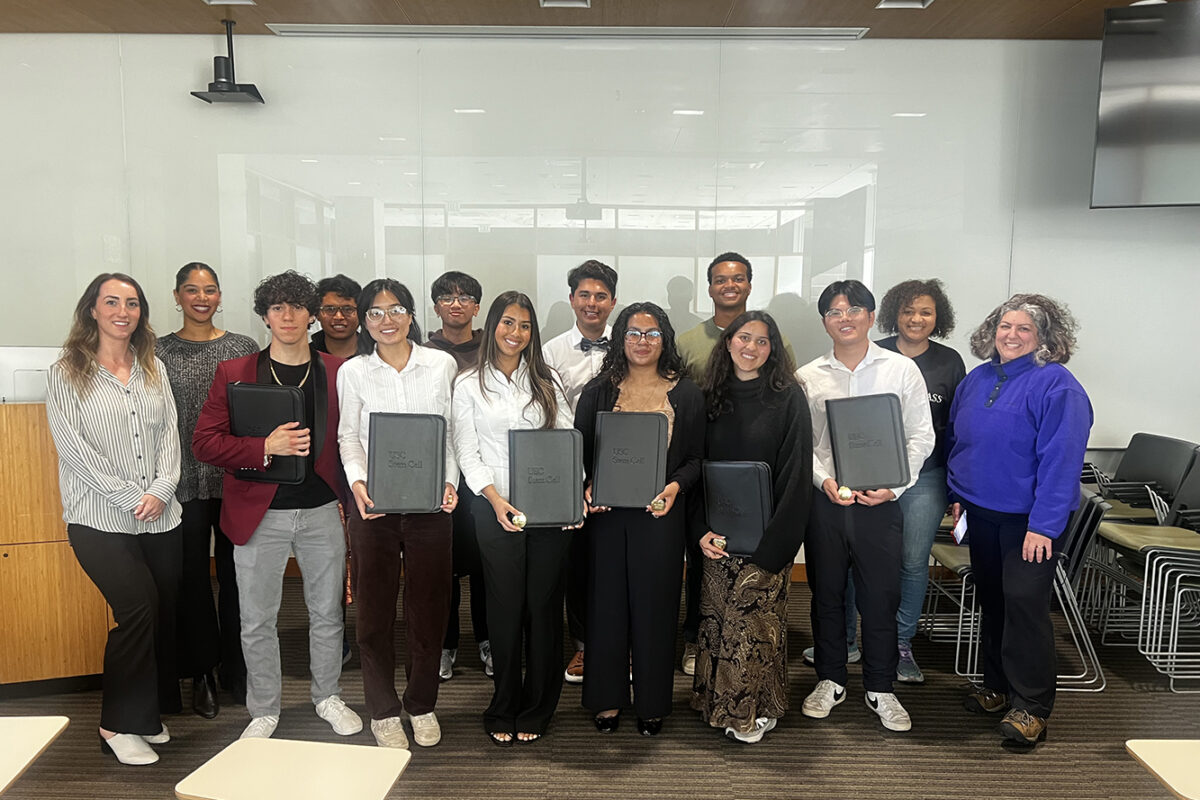
Thirty undergraduates gathered to share their research at the first year-end symposium for USC CIRM COMPASS, a comprehensive two-year program designed to prepare juniors and seniors for careers in stem cell biology and regenerative medicine. The program is supported by a $2.9 million grant from the California Institute for Regenerative Medicine (CIRM), the voter-created state agency that distributes public funding to support stem cell research and education.
The program’s director Senta Georgia welcomed the first three cohorts of COMPASS students—10 rising juniors, 10 rising seniors, and 10 graduating seniors—to the April 24 event at the Eli and Edythe Broad Center for Regenerative Medicine and Stem Cell Research at USC.
“COMPASS was just an idea two years ago,” said Georgia, a principal investigator at the Center for Endocrinology, Diabetes, and Metabolism at Children’s Hospital Los Angeles, and an associate professor of pediatrics and stem cell biology and regenerative medicine at USC. “Francesca Mariani wrote the grant, and USC is actually the only private institution to have a COMPASS program in the entire state of California. It’s a testament to the students that we have here and to the strength of our program, supported and led by the Department of Stem Cell Biology and Regenerative Medicine.”
Launched in summer 2023, the program represents a multidisciplinary collaboration among three schools at USC: the Keck School of Medicine, the Viterbi School of Engineering, and the Dornsife College of Arts, Letters, and Sciences. It’s one of 16 COMPASS programs, including several at University of California, California State University, and community college campuses across the state.
“One of the most rewarding parts of building COMPASS has been working closely with these talented students to develop their course curricula—rooted in developmental and stem cell biology, with a clear eye toward clinical application,” said COMPASS Co-Director Francesca Mariani, associate professor of stem cell biology and regenerative medicine, and integrative anatomical sciences.“Watching them grow into confident young scientists, capable of thinking critically and contributing meaningfully to regenerative medicine, has been incredibly inspiring.”
The 10 graduating seniors from the first COMPASS cohort, who started the program when they were rising juniors in summer 2023, gave flash talks about their research.
Aleeyaa Alam gave a presentation about best practices for creating plain language summaries that make scientific research accessible to non-expert audiences, which was the focus of her project with the South California Clinical and Translational Science Institute (CTSI).
Victoria Bogomilova from Yulia Shwartz’ lab spoke about how testosterone might decrease nerve connections with hair follicle stem cells, providing insight into the biological basis of hair loss.
Matthew Corralejo from Albert Almada’s lab talked about regenerative cells in lizard leg muscles following injury, contributing to the understanding of muscle repair.
Jay Gallo shared his work with the USC+CHLA CIRM Alpha Clinic, identifying key factors among clinic staff, clinicians, and patients that influence clinical trial participation in underserved Los Angeles County communities.
Marc Angelo Gumangan from Tom Lozito’s lab addressed why crested geckos, unlike most lizards, don’t regenerate their tails, uncovering clues about species-specific regenerative capacity.
Kimberly Luna Benitez from Ching-Ling (Ellen) Lien’s lab presented her research about why females experience more serious lymph-related complications following heart attacks than males.
Kenneth Nguyen from Adam MacLean’s lab presented a new model for how progenitor cells differentiate into monocytes, a key type of immune cell.
Kenneth Phung from Giorgia Quadrato’s and Megan McCain’s labs analyzed neural circuitry of rudimentary mini-brains grown on microchips, an innovative way to understand neuropsychiatric disorders such as autism.
Madison Pierce from Megan McCain’s lab described her studies on heart muscle cells derived from stem cells of patients with hypoplastic left heart syndrome, a birth defect in which one side of the heart doesn’t fully develop.
Chris Young from Shahab Asgharzadeh’s lab shared his work isolating and quantifying cancer stem cells from patient blood samples from children with high-risk neuroblastoma to help predict treatment outcomes for this aggressive pediatric cancer.
The event also featured research posters from the second COMPASS cohort’s 10 rising seniors, who started the program as rising juniors in summer 2024.
Ahvital Artison from Cristal Hill’s lab showed how low-protein diets affect stem cell pluripotency and gene activity in fat tissue.
Brandon Barnes from the Lozito Lab shared his research about how blood vessels form in regenerating lizard tails.
Alara Berkman from James Amatruda’s lab showed how experiments with zebrafish can enhance our understanding of pediatric tumors.
Daniela Gioia from Amy Merrill’s lab studied mice with temporomandibular joint disease (TMJ) to investigate the potential role of joint stem cells in the progression of this painful arthritic condition of the jaw.
Henry Le from Michael Bonaguidi’s lab talked about how to rejuvenate neural stem cells in old mice.
Bangui Qian from the Mariani Lab presented her work about rib regeneration following surgeries that removed large sections of bone.
Catcher Salazar from Leonardo Morsut’s lab described his progress engineering genetic circuits to guide the elongation of gastruloids, which are rudimentary stem cell-derived embryos grown in the lab.
Welela Solomon from Oliver Bell’s lab detailed her research about a protein called ZNF462 that may be associated with neurodevelopmental disorders.
Tiffany Wang from Ryo Higuchi-Sanabria’s lab described how aging is affected by molecules that alter actin, one of the proteins involved in contracting muscle fibers.
Micaela Zamora from Laura Perin’s lab discussed gene regulation related to cancer stem cells in Wilm’s tumor, the most common form of kidney cancer in children.
Sensing the enthusiasm in the room, Chuck Murry, chair of the Department of Stem Cell Biology and Regenerative Medicine and director of USC’s stem cell research center said, “You can’t know this kind of thing until you all get older, but you get this surge of energy from seeing these bright young minds excited about science.”
He told the students: “It’s our privilege to guide you a few steps along in your journey. Science is a big relay race, so you all will be stepping up to take your turn to run your legs.”
